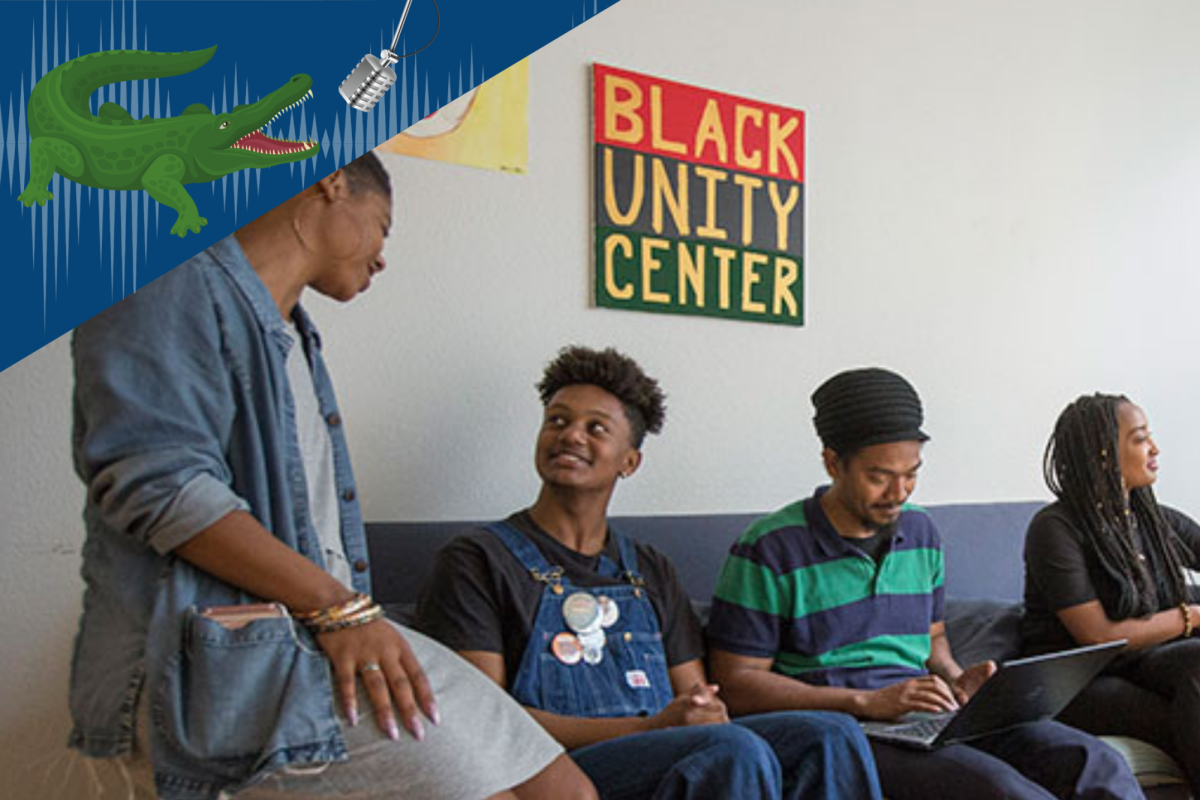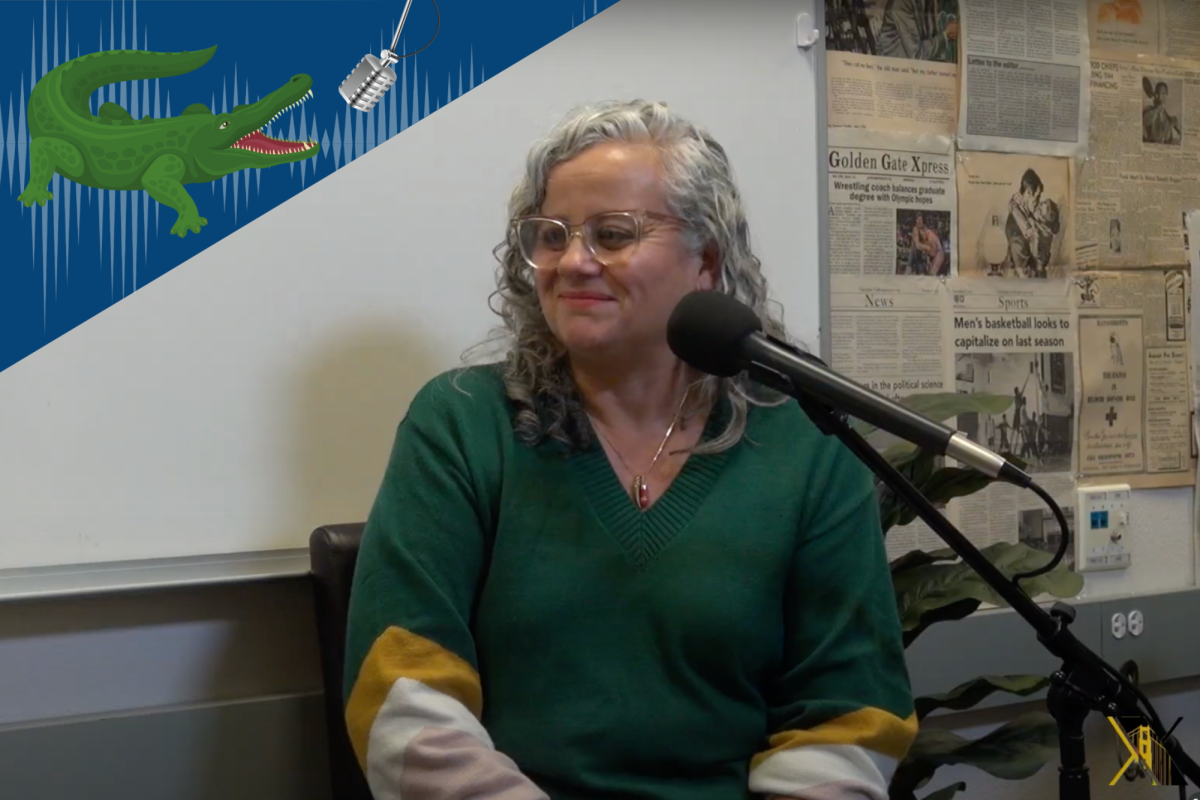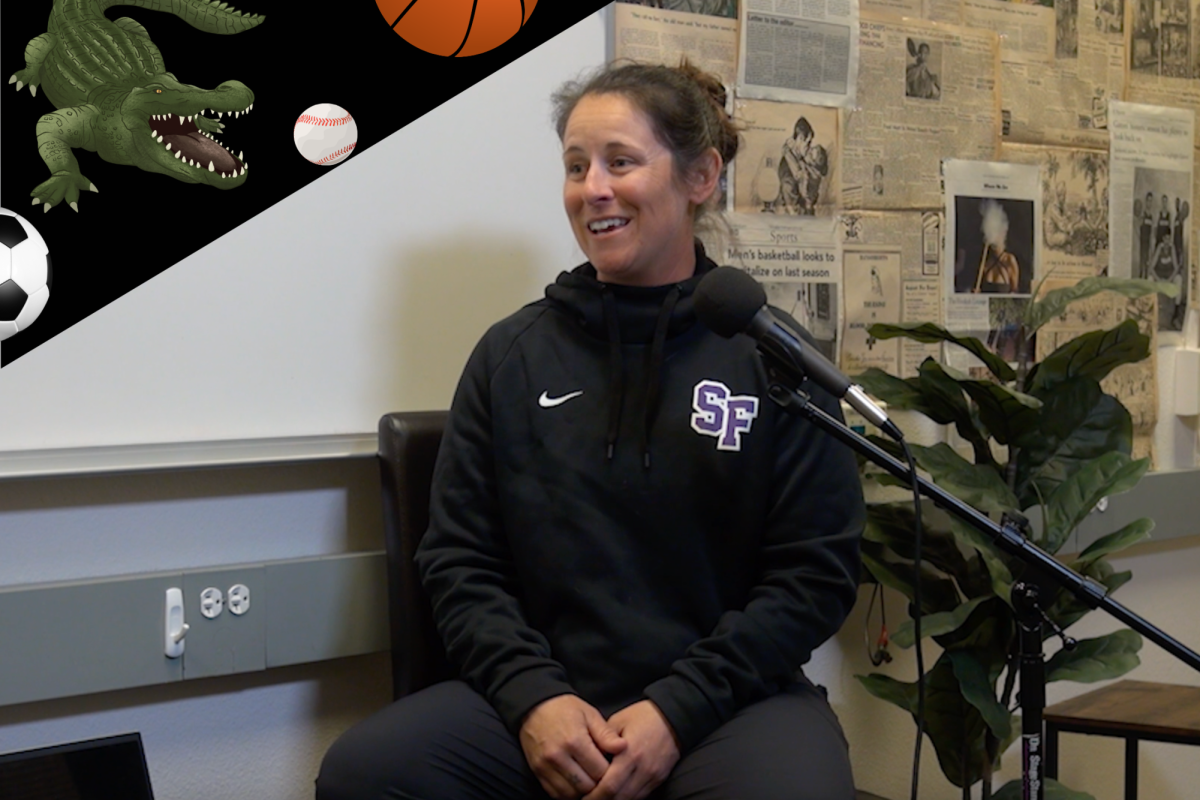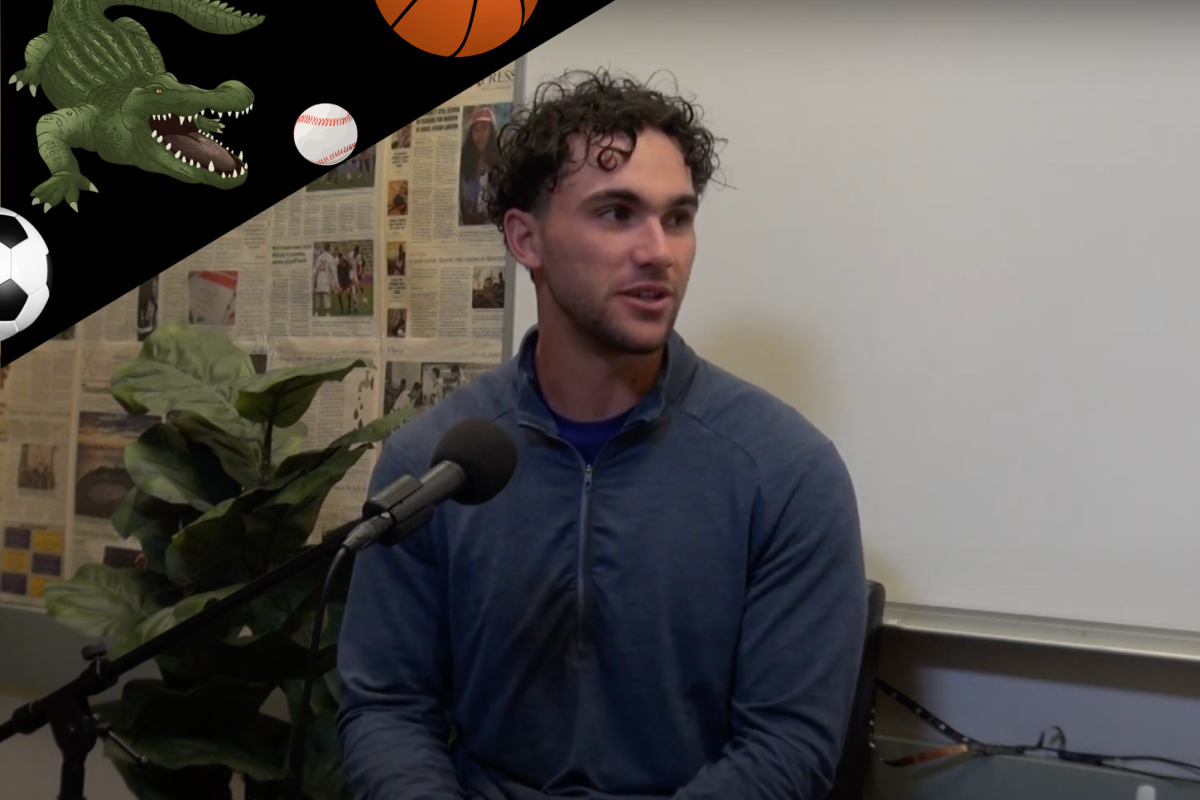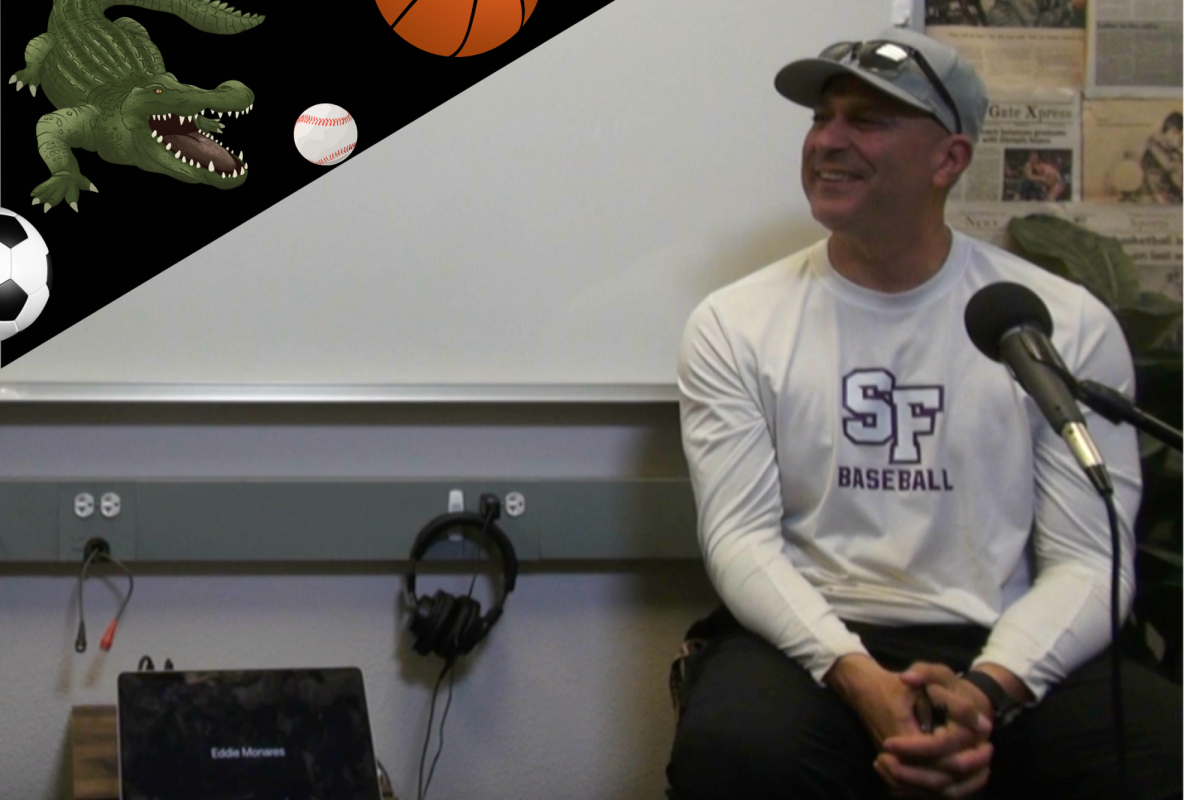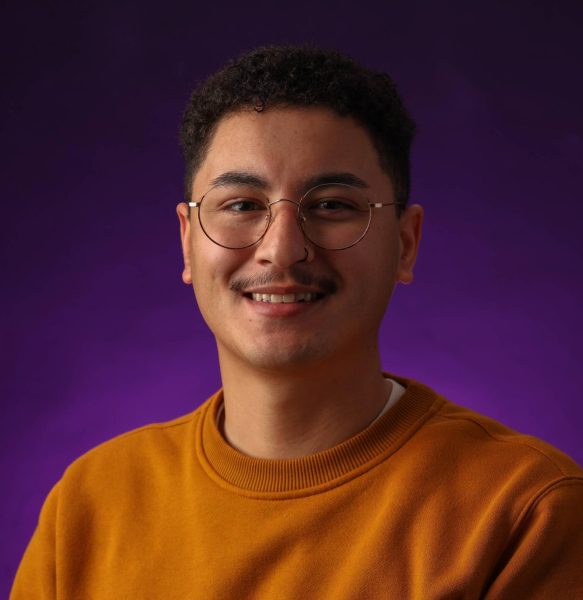Introduction
Shaw: 00:00-00:10
Welcome to Gator Talk. My name is Elijah Shaw. I’m a staff reporter for Golden Gate Xpress. Today, we have our guests, Dalyce Brown and Sparkle Williams.
Brown: 00:10-00:18
Hello! So once again, I’m Dalyce Brown. I’m the outreach, recruitment and retention specialist of the Black Unity Center, and then I’m also the BSU advisor.
Shaw: 00:18-00:21
And then Sparkle, can you tell us about yourself too?
Williams: 00:21-00:29
Hey guys, I’m Sparkle Williams, BSU secretary, senior, graduating with a major of CAD and adolescence.
Interview
Shaw: 00:29-00:46
Cool. So thank you all for coming and talking about the Black Unity Center and kind of just, you know, topics around that as well.. To start off, like can you tell me about, you know, your experience at SF State, how long you’ve been here, and you know, what it’s been like for you?
Williams: 00:46-01:30
My experience at SF State has been, I would say like every other college student’s life. It’s been a real roller coaster. I transferred here in ‘23? 2023 fall, and it wasn’t the best because I was very to myself at first with this being a PWI Predominantly White Institution) and not knowing a lot of people or seeing a lot of people like myself. So once I came into the Unity Center and I got to meet my community, that’s when everything started to rise. And then, I got more invested with clubs that we have on campus. My experience, it became pretty great. I’ve enjoyed the ride honestly, and can’t wait to finish it.
Brown: 01:30-01:53
I would say my experience as a staff member has been really rewarding. I’ve been here for about two and a half years now,, so I’m actually able to see, students from sophomores now, juniors and seniors, graduating, getting jobs and seeing the growth and development and the leadership, seeing the community come together, seeing the ups and downs, because we’ve been on the roller coaster, right?
01:53–02:36
Students come in. “I need to vent. I got dropped from a class. I need to add a class. I don’t know where to o.” You know, everyone’s just so frustrated, and they get so stressed. And then when you’re able to sit down like, “Hey, we’ve all been through it, we’ve all been we’ve all been there. There’s answers, there’s steps. It’s OK. You’re not alone.” I can’t explain. It’s just, it’s such a good feeling. I know sometimes, us as staff members, we’re like, we don’t want to stay that late, but I love staying late sometimes just because, you know, students, they need it. And if they’re able to build that community, they’re able to just progress and, you know, do better for themselves.. So, from my experience, I would just say it’s just been overall rewarding no matter what.
Shaw: 02:36-02:44
And how many students would you say you guys serve at the Black Unity Center?
Brown: 02:44-03:17
All of them. It really depends on the day — like physically, you know, I’ve seen maybe like 30 people sign in and, you know, it really just depends on the day if we have an event. But realistically, we serve all the students, too. It just depends on… because of like our location, sometimes students don’t know where we are, especially if you are a commuter student and you don’t live on campus. So it’s kind of hard to find where we are to have that first start, but I would say we serve a good amount of students that come in and out though.
Shaw: 03:17-03:23
Well, can you tell me a bit about, you know, your experience in the BSU, and maybe what that’s looking like this year?
Williams: 03:23-04:26
Speaking on behalf of myself and like my peers I’ve seen in there, there has been loads of friendships that have been created solely based off being in the BUC. I’ve learned a lot, especially from just the random encounters of other Black faculty and staff walking in there because they need something or they need to print papers. Also, I’ve been able to encounter different advisors, like some from AAPI, who’s also next door because sometimes they may need a knife or a fork and we provided. So I would say I’ve learned a lot about communication, creating new bonds and just learning to enjoy life as it comes. Because in the BUC, it’s never a random moment.. You could be in there like, “Oh, I’m crying, I need a nap, I just got dropped. I don’t have any money to pay for school. Well, what am I going to do?” Next thing you know, you’re learning line dancing in front of TV. It’s amazing, I really can’t complain.
Shaw: 04:26-04:35
For people that, like, don’t know what the BUC is, can you give us a good rundown? Like kind of, you know, amenities and what’s provided in the space?
Brown: 04:35–5:07
Yeah, so the Black Unity Center, we like to say that we’re your home away from home, right? So we do resource referrals. We have partnerships with an organization called Black to the Future, where if you do an application, they’ll sometimes help pay for books, right? We do partnerships with housing all the time. Events. RHA [Residence Hall Association].HA [Residence Hall Association]. We do leadership workshops, professional development, cover letter, resume support, financial aid workshops. Also, if you need help with financial aid, we have Jimmy. Jimmy will help assist. He was in financial aid for about 20 years.
5:07–5:32
So it’s all about being a starting point for connections, right? Right now, because I don’t do, personally in my position, I don’t do academic advising. But like Sparkle says, Shannon does, and Shannon is in AAPI. So sharing those students, the community, that love. Because Shannon’s like, “Yeah, come on down to my office.” Like we’re all together, the affinity centers. Just because it’s Latinx, just because it’s Asian American Pacific Islander, does not mean your community is not in there.
5:32-06:18
That is just one core identity of who we are as humans. We have so many. We have so many layers. So I would just say like the Black Unity Center, we’re here to support you, right? To have that sense of belonging. If you just need a space to do your homework, right? We can also print for free. My bad, I need to plug that in, you can print for free with us. We got two computers. If you need to do homework though, if you just need to vent, if you need to take a nap, if you just need to get some water or some food. We also, as of right now, we have like a kitchen and everything. Come warm up your food. You can come make some stuff. You just got to clean up, you know. House rules. You know we’re a family. But other than that, the Black Unity Center is literally a place for community and a starting point where if you don’t know where to go, at least come here so we can direct you.
Shaw: 06:18-06:38
You know, the Black Studies department, all these things were, like, created and voiced, you know, by students and for students, right. I wanted to know, like what kind of input and feedback are you getting from students and what things are you seeing change from that voice from students?
Dalyce: 06:38-07:10
That’s a good question. So I’ve only been here for two and a half years, right? And I know there’s so much history on this campus, and we always refer back to the strike and all the Black Studies department, Africana Studies, BSU, the 10 point demands, and then also advocating for the center in the early 2000s. I would say the change that I have seen, honestly, is just more of the community, right? A lot of people they like to bring out the statistics that were only 6% Black.
07:10-07:55
But we have about 2500 Black students on our campus, right? Some of them commute. Half of them live on campus. You just don’t see them a lot because the story of the Black student is we know we have to work, we have to do other things. They get involved in so many other things that you don’t always see them in big numbers, but when we do, it doesn’t get as much focus on it. So, like we have the center. People come in, people come and then they’re like, well, what’s going on with BSU? BSU is always tabling, BSU was tabling last semester. You know? So, I would say the change is not that there hasn’t been change. I think there’s just, it looks different, you know? The students, we always take their feedback in the Black Unity Center. If you go to the center and look at just how it’s evolved, right?
07:55-08:42
I would say it’s not about change, but more about growing and just the evolving of everything. How it looked last year is different from how it looked this year, right? Because they wanted more space, more room in the Black Unity Center. So we just kind of moved the furniture around, right? We made it more open. People wanted better access to the printer, so we brought it out to the room, right? “It’s cold in here,” oh, let’s get a heater. We noticed that certain foods students liked more of, we’re going to go ahead and get more of that. So it’s all about how the students advocate, but come to the center because we always take their feedback. We always want the feedback and we always want to support them. So I would say it’s not about change, it’s all about what’s happening now and I would just say it’s a lot of growth and transitions and things going on like that, but it’s really good.
Williams: 08:42-09:45
The center’s a large melting pot so you’ll never know what you find in there. And I guess based off who you running into there, is where you build that comfort to communicate. Because you can just go in there one day and be like “I’m starving. I don’t have anything to eat.” And then somebody be like, “oh, just have some noodles” and then they point you to the little pantry and you go warm it up, you get it. Or you’ll be like “I can’t do my homework,” or “I didn’t have access or enough time.” There’s always somebody in there that can provide you with a resource that will help, which is a very great attribute that I would say from being on campus as a commuter student. It’s always great to have something and somewhere you can have comfort in. Sometimes I don’t have class until 12:00. I can come sit in the unity center at like 9:30 till 11:30, 11:45 — however long I need to be there and get ready and get everything done that I need to get done.
09:45-11:02
Like Dalyce said, you don’t see a lot of the Black students around campus. If you do, we’re very scattered. So I would say that the Black Unity Center has very — it has strength in the odds of you running into somebody like yourself and also run into someone different that you didn’t think you would click with. Like one day I was sitting in the Black Unity Center and I was just sitting back and I was just. like I had already disassociated from the whole event, and I was just sitting there and I was like “Wow.” In here, you never know what you’ll run into. Like this is a very odd group. You have the punk rock kid, the fashion boy, the nerd quote unquote, the alpha woman, the frat boys, the frat girls, the smarties. Like, you have everything in there and then on top of that, majority of them may be Black. So you’re like, “Wow, I didn’t know I could encounter any of this, just being little old me,” coming from… maybe you’re the first-generation college student, or you were in the suburbs. You didn’t really speak to anybody. You’re an only child. So you never know what you’ll run into, and I think that is a great, I guess, change that may be in the BUC, but everything seems pretty normal, is very natural and organic in there. So, I wouldn’t complain. It’s pretty great.
Brown: 11:02-11:47
Yeah, I would say that in the center, you know we have a saying if you know, if you see another Black student, if you see somebody in this center, you better speak to them again outside the center. And like that’s another thing, the center is not just a physical space, but it’s just about the students who come in there. So like Sparkle, she doesn’t work here. She just does BSU and I’m her advisor, but she does a lot of volunteer work for the center. As you know, for other students who do, like “I’m not trying to work here or anything. I just want to help out,” you know. I have one student who loves the whiteboard because she wants to update it and it’s just that community and that sense of love, as I would say, is a game changer for the center as well. Because it’s not once again, the physical space, it’s who the center affects outside of the space. That’s what really matters.
Shaw: 11:47-12:12
Sparkle, as a student, especially a commuter student, how important is it to like, have that center? Not just because it’s called the center, but a space that’s centered where you can come through and take your time in between classes or meet people. I think the narrative is that because we’re a commuter school, you don’t really get a chance to connect with people. Do you think that’s something that people just don’t really seek out?
Williams: 12:12-12:59
I would say as a commuter student, I wouldn’t say that’s something we don’t seek out because growing up, in the movies, on TV, this is the college life you see, this is what you expect. But I would say about having the BUC and every other student center that we have on campus, it is very necessary to have. Regardless of what you may say, you may be true to yourself, you may be somebody that likes to be a Lone Ranger. Everybody needs somebody. And having an area or a group of people around you, a community that you know you can lean onto is very important, especially as a commuter student because we don’t have time. Like Dalyce said, you’re going either straight to class and from class, I have work. I don’t know what events are coming
12:59-13:46
So one way I found out about the center, it’s not ’cause I didn’t seek out, it’s because I was busy doing A, B and C trying to make sure I had all my credits, my job. I can do everything I need to do. I was in financial aid one day and one of the workers was like, “Hey girl. The BUC is right across. You should go check it out if you’re looking for us, there’s AAPI. There’s a Latin studies over there as well. Everything’s in that small little building if you walk out and go by U.S. Bank.” I was like, “Hm. I’m gonna have to check it out ’cause I never heard about it.” So, I wouldn’t say it is on behalf of seeking, it’s on the promotion of it. If you don’t know, how are you gonna find something if you do not know you have access to it?
13:46-14:24
If it’s promoted and it’s put out there for you to see it and you don’t take advantage, then I would say that it is on you not seeking it or you not taking it while you got it. That’s like somebody trying to give you some money and you’re like, “No, I don’t want it. I’ll do it myself.” You’re just being hard headed and that is a lot of problems that is just going around the community. Everybody has pride. Nobody wants to ask questions because sometimes you can get shut down so many times, you give up. So knowing that you have people that will tell you where your resources are, how you may use them, and even take it and elevate it, it’s always beneficial, so as long as we can see it, we can achieve it.
Shaw: 14:24-14:41
Do you think there’s like a value in finding those resources in a space like Black Unity Center or whatever it is that fits with your identity, and having someone there to speak to rather than the financial aid office as a whole at the school where they’re serving thousands of people every day?
Williams: 14:41-15:21
I would say it’s important, but I wouldn’t say it is… it depends on the specifications of the person. I wouldn’t say, “Oh, I enjoyed the Black Unity Center because it’s Black-based, because I’m Black or I’m African American or I’m Jamaican, I identify as a Black person. I wouldn’t say that’s what makes it beneficial, or that’s what makes it special to us. I would say us having genuine people that we have ran into in the BUC have made the center so special, not because of what’s on the walls or what it stands for. It’s more so because we were actually able to meet people that we either see ourselves in or we want to see ourselves in, that we can grow from and benefit from.
15:21-15:50
Just like how we spoke about Shannon and the man from Latin Studies, Emmanuel. I ran into him and there was also this Filipino guy that worked in there and he’s from Oakland, me as well from East Oakland. So we clicked immediately, and it has nothing to do with how they look. It’s just the energy they gave off that made me feel like, “OK, this is somewhere I want to be. I feel comfortable. I’ll come stop by more often.” So I wouldn’t say it’s based off the actual building, but about what’s in it.
Shaw: 15:50-16:10
I want to talk about changes that are coming to the Black Unity Center. We reported on it, I think early last year, last fall, just like changes in general to affinity spaces and stuff like that.
Dalyce, could you talk a little bit about some changes that are coming in the next year or so?
Dalyce: 16:10-16:44
I believe by this fall we will be in SSB 206. You know they started construction. So we will have all the respective centers will have their own space and so will the staff members will have their own office spaces as well. We will have multiple refrigerators and I believe one kitchen, but multiple refrigerators for food, dietary restrictions and stoves as well. It’s a community space for, you know, for the students to come mingle with each other, and that’s about it. It’s. I don’t know if you’ve seen East Bay’s?
Shaw: 16:44
No, I haven’t.
Dalyce: 16:44-17:05
Yeah, it’s almost similar to like what East Bay has. And they have a really good community. If anything, it brought all of them together, all the affinity centers together. So we’ll be together in proximity, and I think you know, like Sparkle said, it will be in more of a space where students would be able to find us now because everyone’s going to be in the Student Services Building right by financial aid, admissions, student engagement and transitions.
17:05-17:50
So I look forward to it because it’s something new. I know sometimes people are not always open to change and something new, but I believe, you know, what Sparkle said, is how we make this space, right? The students, we’re still gonna be here. It’s not gonna change anything. If anything, it’s gonna open us up to new experiences, other people. Because I go on Latinx Center and you know, y’all shame me for this but I love the snacks in the Latinx center, like I’m always going over there like, “What y’all got going on?” Like, you know, and seeing them come together, you know, doing more events as well. You know how we did DECI [Division of Equity and Community Inclusion] week before and things like that. I look forward to it. So yeah, they said in fall of 2025, we should be all up there. We gonna, you know, get to decorate and have a nice little opening, hopefully. It’ll be good, I think, yeah, I think so.
Williams: 17:50-18:43
As a student, it’s scary for sure. Hearing that, “Oh, they’re shutting down the buildings. They’re shutting down the buildings.” Like where are we going to go? I’ve gotten comfortable here. I’m scared now, so the way it was introduced was very frightening. I’m not gonna lie. A lot of my peers and myself were like, “Oh, no, they can’t do that. Why would they do that?” We just finally got comfortable here, but after investigating and hearing more about it and being open to the idea, I think it could bring us some more resources. Where there’s change, there’s change for better, there’s change for the worse. I feel like there’s always room for improvement, and if we can all come together like we already do, I don’t see anything bad that can come with it as a unit. Honestly, I’m excited to see what happens. If they got better snacks, let me know. College kids is hungry.
Shaw: 18:43-19:02
How do you feel, like just the proximity of being next to other spaces and other, you know, clubs or centers is going to affect, you know, students coming in? Maybe they have, you know, identities that crossover into different places and they can just bounce from one place to another really easily. Do you think that’s going to change anything regarding people that come in?
Brown: 19:02-19:47
No, I don’t believe so. I think people are, in a way, when you’re able to just go to a different space, right? A lot of people just think, “I don’t belong here because I might not identify in the way that you perceive you should identify.” But once again, like for me, I’m somebody who I used to, at East Bay, I used to work for, you know, an affinity group. It was AAPI, Latinx. They forced us to do events together, and I loved it. I got different perspectives. I got to learn about other cultures, different foods, and we had a lot in common. We all love Disney,so we had Disney day. I’m not a sports girly, but I got fomo. So we used to go to the games together, right? And it was a great experience.
19:47-21:00
So like Sparkle says, change can be scary. You don’t know what’s happening, but if you just trust and you go in with a positive attitude, right? I might find somebody here. Just because I might not look like them or you need to have those conversations, and I do believe that, you know, once we’re in a closer proximity, we’ll have more of those conversations: What we have in common versus what we don’t. Just focus on, you know, the basic things and not the deeper things. So I’m hoping, like this move, it’s going to encourage more collaboration amongst us as different affinity groups in the people of color. And then even those who aren’t people of color. You know I got white students coming to me, right? There’s no discrimination. None of the affinity centers, we don’t turn down students. If you need the support, you find that community. You want to kiki, you want to do karaoke, right? Want to get some Zen going? Want to take a nap? We’re here for you, so I’m hoping that will be highlighted in the new space because you’ll actually be able to see it, right? How many students are really coming in here? I’m hoping that so many students are going to be coming that we might need a bigger space then we have to move again. That’s how I look at it.
21:00-22:03
Truly, I’m hoping that all of this is going to open us up to newer experiences because that’s what college is about. We are a PWI. A lot of Black students want that HBCU experience. But when you are able to learn from different people who don’t always look like you, think like you, you’re able to learn and grow as people, as humans. And when you go out to the real world and you graduate, you’re like, “Wow, I was able to do this, that and the other.” That’s what I look forward to, right. I’m hoping that the students who are scared, or who are uneasy about it, are able to see it from that perspective and just go in with that attitude because we’re not always going to get along. That does happen from time to time, but there are ways to get around that, you know, and be respectful. And I think with everything that’s going on, I don’t see a lot of those conversations happening. I see a lot of students just want to belong and what community, and if we all focus on that and us as staff members and as DECI, we just keep that mission and vision going. I believe this is going to work out in a great way.
Shaw: 22:03
Great. Well, thank you both for coming in.
Dalyce: 22:05
Thank you for having us.
Shaw: 22:06
Yeah, of course.
Williams: 22:06
Appreciate it.
Brown: 22:07
Yeah, you’re sweet.
Williams: 22:08
Yeah, come back anytime.
Shaw: 22:10
Alright. I might have to. Before we go, is there anything coming up for BUC or BSU that you want to, like, shout out, let people know?
Brown: 22:19
In March, you know it’s Women’s History Month. We will be doing a sister-to-sister talk. As well as, I believe the week after we’re going to try to have a leadership week and have some Black-owned businesses just come speak and like, provide mentorship.
Williams: 22:34
We at BSU, we normally host events every other Wednesday for everybody on campus to come out. Jabuulani always has something going on. The Greek orgs on campus has things. If you want to stay up to date. We all have Instagrams for BSU we’re @sfsubsu. I believe Jabuulani is @jabuulani.sfsu on Instagram.
Brown: 22:54
Also, check your emails because I link all of the organizations and resource referrals through our Black Unity Linktree. And also it’s on the Black Unity website if you want to be connected to any of those resources that I named and student groups.
Outro
Shaw: 23:11
That was Dalyce Brown and Sparkle Williams. I’ve been Elijah Shaw. Thank you for listening to Gator Talk.





